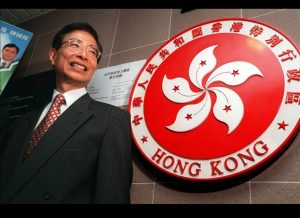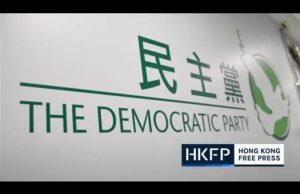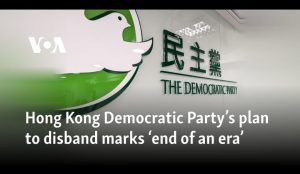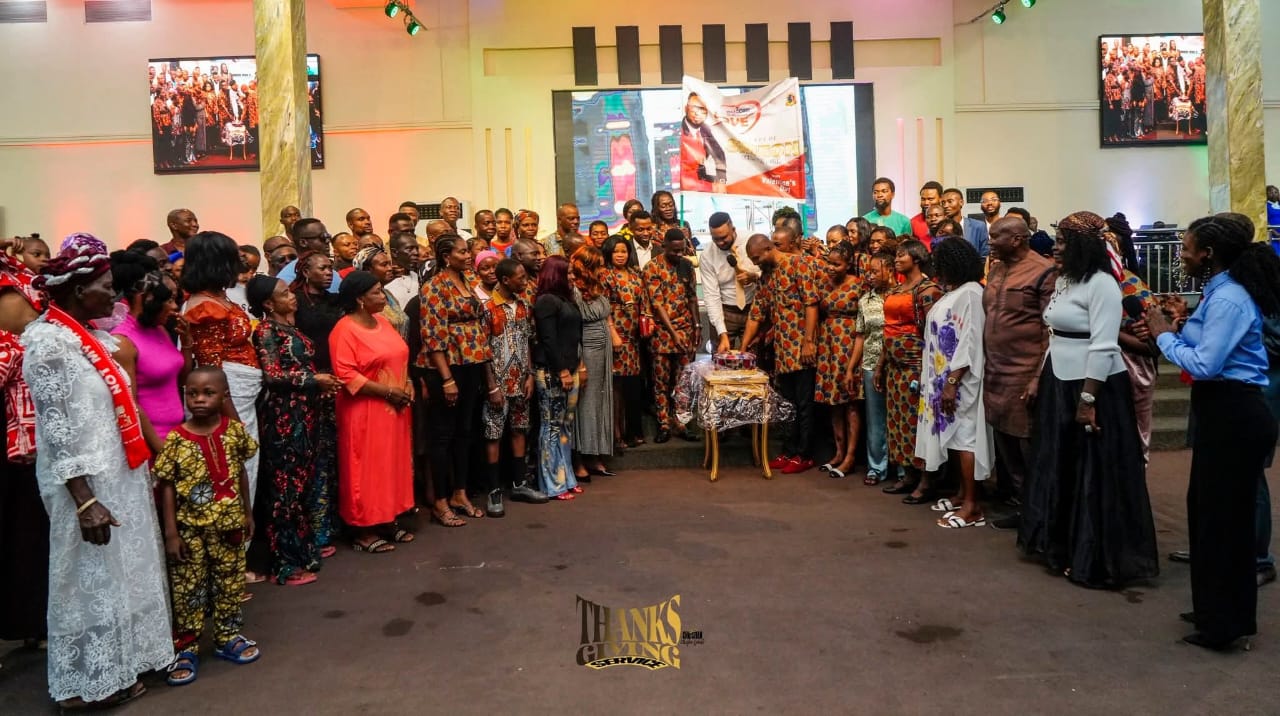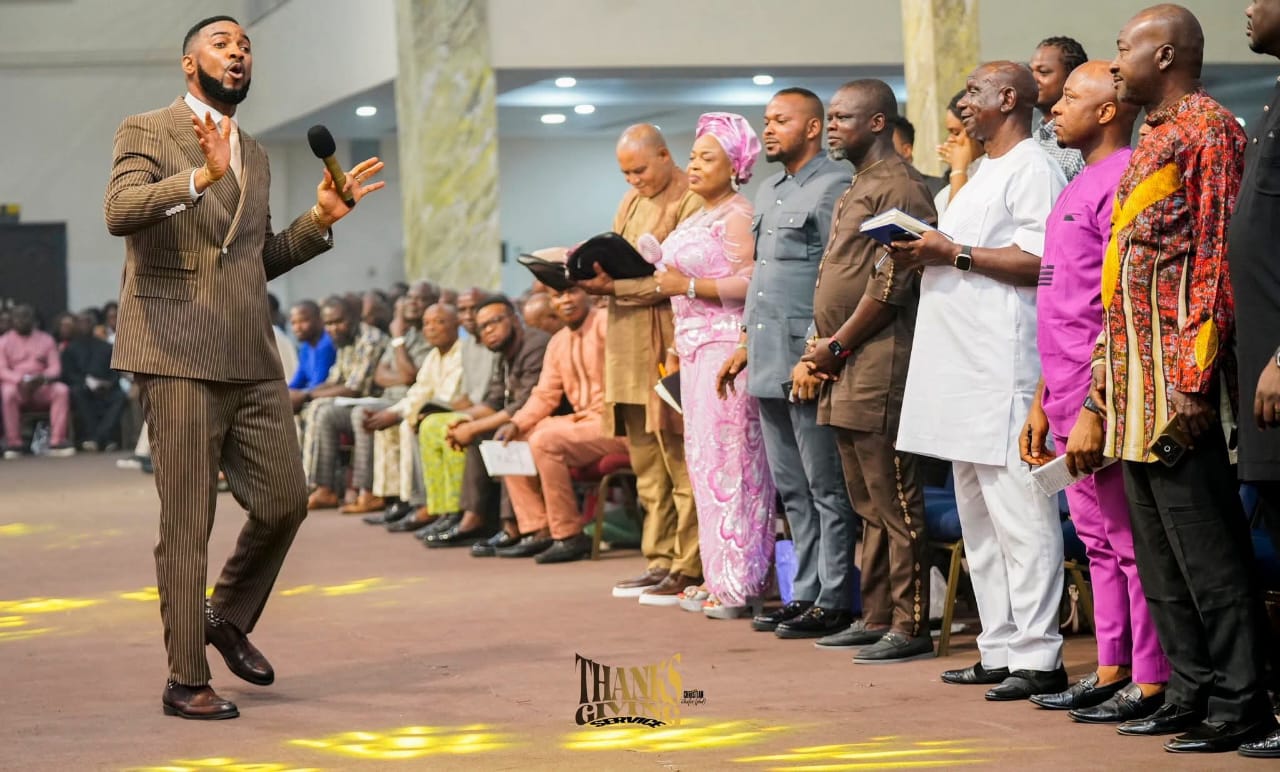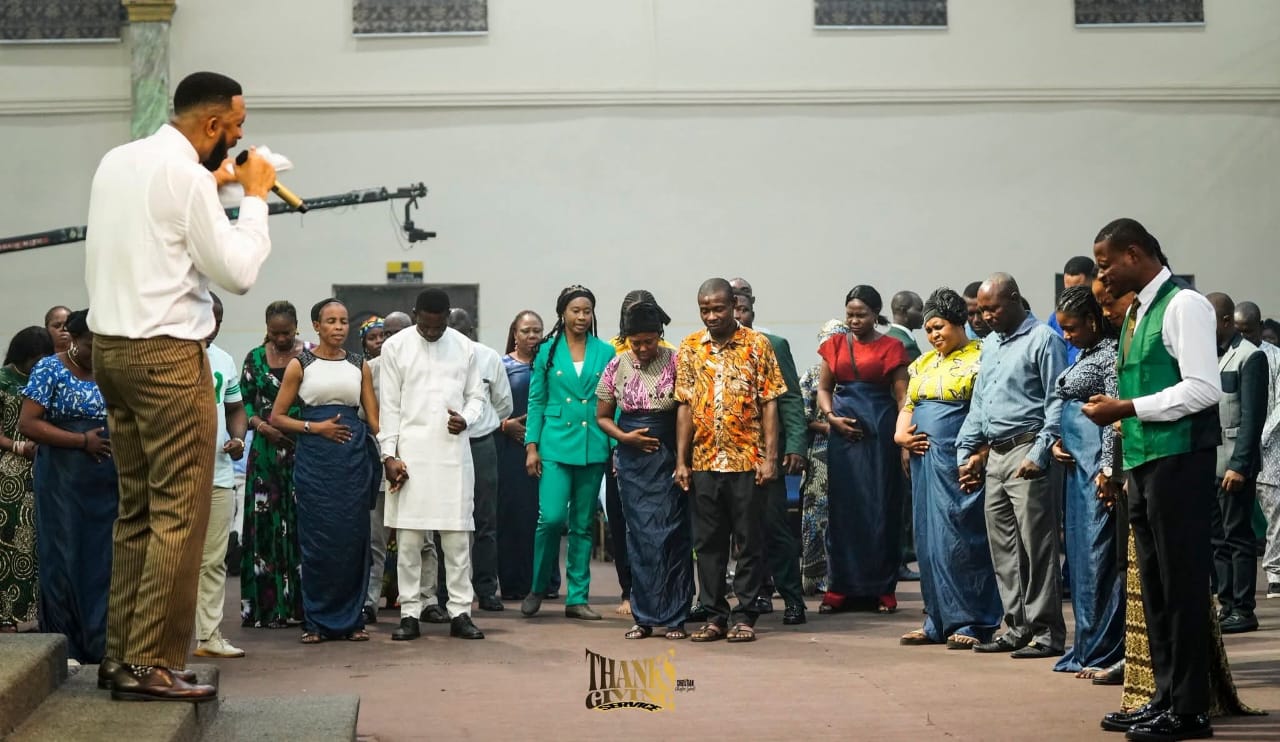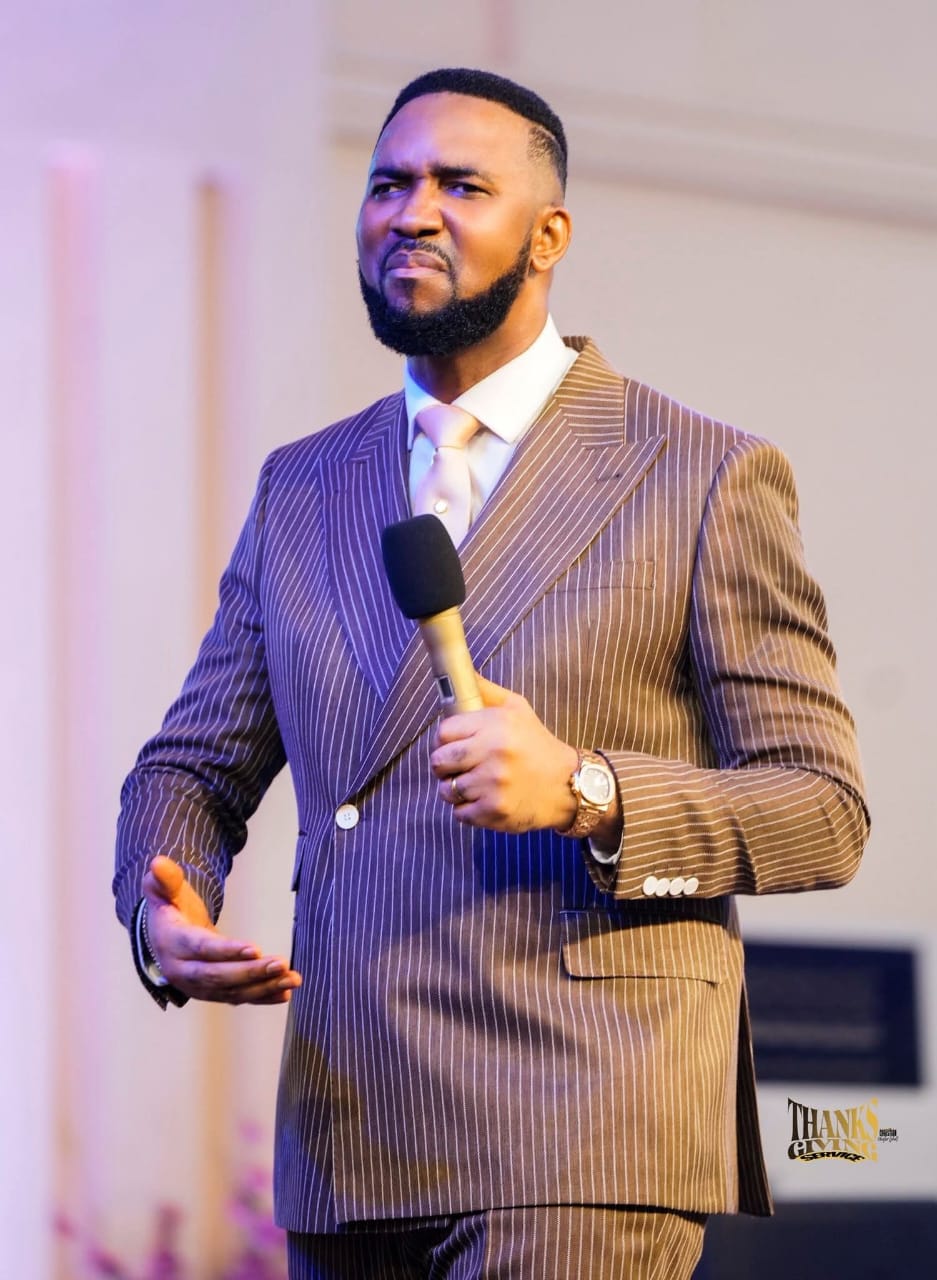society
The Final Nail: The Dissolution of Hong Kong’s Democratic Party and the Death of Dissent
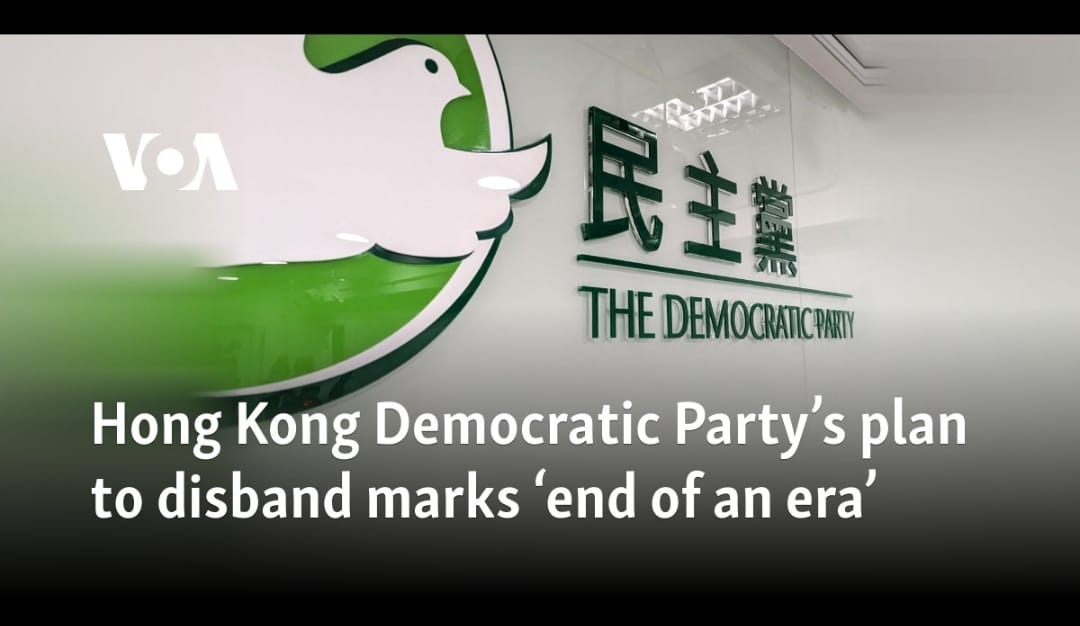
The Final Nail: The Dissolution of Hong Kong’s Democratic Party and the Death of Dissent
By George Omagbemi Sylvester
In a move as symbolic as it is devastating, Hong Kong’s Democratic Party, once the largest opposition voice in the city’s legislature, has announced it will begin the process of dissolution. This marks a tragic but predictable climax to Beijing’s iron-fisted campaign against democracy in the once semi-autonomous region. For Hong Kongers and for freedom-loving people worldwide, this is more than the end of a political party; it is the funeral of a political dream, the demise of a free society systematically crushed by authoritarian power.
Established in 1994, the Democratic Party emerged from the post-1989 pro-democracy wave following the Tiananmen Square massacre. For over three decades, the party served as a formidable pillar in Hong Kong’s legislative and civic life. With its seasoned leadership, grassroots support, and unwavering commitment to democratic reform, it represented the conscience of a city once proud of its autonomy and civil liberties. Today, the very space that allowed such a party to exist has vanished, swallowed by the creeping shadow of the Chinese Communist Party (CCP).
From Autonomy to Authoritarianism
The 1997 handover of Hong Kong from British to Chinese rule came with a promise: “One Country, Two Systems.” This agreement, enshrined in the Sino-British Joint Declaration and guaranteed until 2047, assured Hong Kong its own legal and political systems. But over the years, and especially after the 2019 protests, Beijing has systematically eroded every semblance of that promise.
The implementation of the 2020 National Security Law was the fatal blow. Drafted and imposed unilaterally by Beijing, the law criminalized acts deemed as “secession,” “subversion,” “terrorism,” and “collusion with foreign forces.” Its vague language has been deliberately exploited to target journalists, activists, educators, and politicians alike. The Democratic Party, being a leading proponent of democratic governance and civil liberties, inevitably found itself under siege.
Party members have been arrested, disqualified from elections, and subjected to relentless surveillance and intimidation. The once vibrant ecosystem of opposition politics has been decimated. Civic groups have disbanded. Independent media have been shuttered. Courts have been transformed into instruments of political repression. In this context, the Democratic Party’s decision to dissolve is not a surrender, it is a forced exit.
Emily Lau: A Voice Crying in the Wilderness
CNN’s Kristie Lu Stout recently spoke with Emily Lau, former chair of the Democratic Party and one of Hong Kong’s most respected political figures. Her words were a mixture of sorrow, anger, and bitter realism. Lau acknowledged that the party’s dissolution signals a “very, very dark day” for the city’s political future. But she also warned that the pro-democracy movement is not dead—it is merely transitioning into survival mode under extreme duress.
“We were not terrorists. We were not traitors. We were citizens asking for the basic freedoms we were promised,” Lau said. Her words echo the sentiments of millions of Hong Kongers who have watched their city transformed into a police state in a matter of years. The tragedy here is not only the loss of political space but the betrayal of trust. Beijing’s actions constitute a direct violation of international agreements and an affront to the global democratic order.
Silence of the West
Equally disheartening is the muted response from the international community. While the United States, the European Union, and the United Kingdom have issued condemnations and imposed symbolic sanctions, these actions fall far short of what is required. Economic interests continue to trump moral obligations. Corporations remain embedded in Hong Kong’s financial sector. Diplomatic posturing has replaced concrete action.
The dissolution of the Democratic Party should be a wake-up call. It is proof that no entity, no matter how established or respected, is safe in the face of authoritarian expansion. If the world allows Beijing to get away with extinguishing Hong Kong’s freedoms, it sets a dangerous precedent for Taiwan, Tibet, Xinjiang—and indeed for democracies worldwide.
The Broader Implications
The erosion of democracy in Hong Kong must be understood not as an isolated tragedy, but as part of a broader authoritarian resurgence sweeping across the globe. From Vladimir Putin’s Russia to Recep Tayyip Erdoğan’s Turkey, and from theocratic regimes in Iran to the autocratic entrenchment in parts of Africa and Southeast Asia, the trend is clear: democracy is under siege.
Hong Kong was once a beacon of what China could become—a hybrid model where capitalism and freedom coexisted. That vision has now been violently snuffed out. The Democratic Party’s demise sends an unmistakable message: China’s model of governance is incompatible with political pluralism.
It also reveals the limitations of soft power. While the West celebrated globalization and engagement, Beijing was building a surveillance state and refining its tools of repression. The result is the world’s most technologically advanced dictatorship, now exporting its censorship model through trade, diplomacy, and military assertiveness.
What Comes Next?
For the people of Hong Kong, the future is uncertain and frightening. Many activists are in prison. Others are in exile. A new generation grows up in fear, taught to self-censor, to distrust their neighbors, to obey unquestioningly. Schools teach nationalism, not critical thinking. Media outlets echo party propaganda. Elections are tightly controlled and participation is plummeting.
Yet resistance remains. It lives in encrypted chat rooms, in underground art, in whispered memories. It lives in the hearts of those who remember what Hong Kong used to be, and who believe it can be that again. History teaches us that authoritarian regimes can silence voices, but they cannot erase ideas.
Outside Hong Kong, the democratic world must do more than offer platitudes. It must support exiled activists. It must open its doors to refugees. It must impose meaningful economic sanctions and use global forums to hold China accountable. Above all, it must strengthen its own democratic institutions to withstand similar assaults from within and without.
The Democratic Party’s decision to dissolve is a heartbreaking moment in Hong Kong’s history, but it must not be the final chapter. The world owes it to Hong Kong, and to all who fight for freedom, to remember this betrayal, to learn from it, and to act.
As Emily Lau bravely declared, “You may silence us today, but you will never extinguish the light of freedom.” That light now flickers dimly in Hong Kong, but it is not extinguished. It is up to the global community to nurture it, protect it, and one day, help it shine again.
society
UNCOMMON RECOGNITION: Ogun Governor Dapo Abiodun Gifts Car, House to Nigeria’s Best Teacher
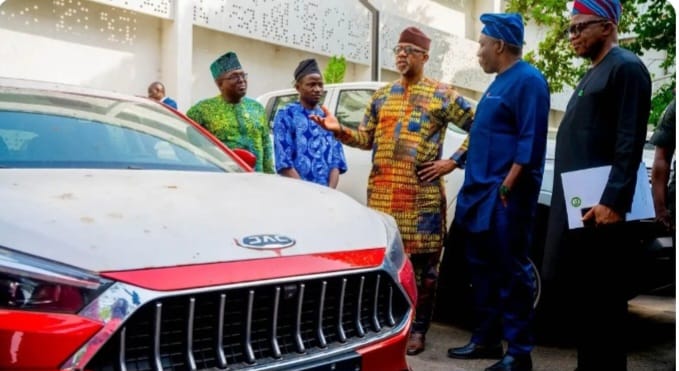
UNCOMMON RECOGNITION: Ogun Governor Dapo Abiodun Gifts Car, House to Nigeria’s Best Teacher
By George Omagbemi Sylvester
“State and federal authorities jointly honour Solanke Francis Taiwo in Abeokuta, underscoring the strategic role of teacher motivation and education reform in Nigeria’s human capital development agenda.”
In a move that has sharply refocused national attention on education excellence, Dapo Abiodun has formally rewarded Mr. Solanke Francis Taiwo, a primary school teacher from Ansa-Ur-Deen Main School I, Kemta Lawa, Abeokuta, with a brand-new car and a two-bedroom house following his emergence as Nigeria’s Overall Best Primary School Teacher for the 2025/2026 academic session. The presentation occurred at the Governor’s Office in Oke-Mosan, Abeokuta on 20 February 2026, witnessed by the Commissioner for Education, Science and Technology and senior ministry officials.
Mr. Solanke’s achievement was first nationally recognised earlier this year at the National Teachers’ Summit in Abuja, where he received a ₦50 million cash award for his outstanding dedication and measurable impact in the classroom.
Governor Abiodun clarified that while the bungalow is being provided under the Ogun State Housing Scheme, the car gift was donated by the Federal Government as part of its broader national recognition of exceptional educators. The governor used the occasion not just to celebrate Solanke’s personal excellence, but to showcase what he described as the tangible outcomes of focused policy and sustained investment in education.
Speaking on the reforms driving this achievement, Prof. Abayomi Arigbagbu, the state’s Education Commissioner, tied the success to the Ogun State Education Revitalisation Agenda; a multi-pillar programme that prioritises curriculum enhancement, improved school management, teacher welfare, infrastructure upgrades, digital learning and professional development. “When you implement policies consistently and efficiently, you will continue to record results,” Arigbagbu said, pointing to back-to-back national accolades for Ogun teachers as evidence of meaningful sector transformation.
Experts in education policy have long emphasised the strategic importance of recognition and reward in strengthening teacher motivation and retention. As educational researcher Dr. Linda Darling-Hammond noted, “Sustained improvements in learning outcomes require environments where teachers are both valued and empowered.” While Nigeria grapples with challenges in schooling quality and teacher support, recognitions of this nature symbolise a positive paradigm shift when carefully institutionalised.
Critically, this development also underscores the often-neglected intersection between governance and human capital development; where targeted incentives can elevate the profession’s status and potentially improve learner outcomes. State authorities in Ogun have argued that such incentives are part of a broader ecosystem approach to education reform.
Mr. Solanke, in his remarks, urged fellow educators to view his recognition as a call to persist in uplifting teaching standards. “I promise to continue giving my best to make Ogun State proud,” he said, reflecting a deep professional commitment that goes beyond personal accolades.
In a climate where education systems across Africa seek scalable models of reform, the province’s spotlight on teacher excellence resonates beyond Ogun’s borders, offering a compelling case study of policy, performance and public affirmation converging for societal benefit.
society
Shot And Turned Away: When Hospitals Demand Police Reports Before Saving Lives
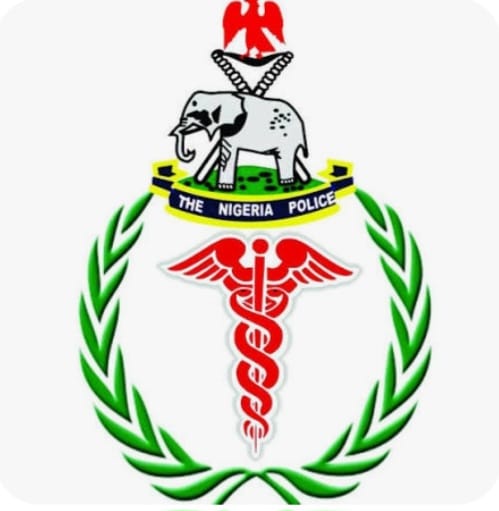
Shot And Turned Away: When Hospitals Demand Police Reports Before Saving Lives
By George Omagbemi Sylvester
“How Nigerian Law Confronts a Deadly Culture of Bureaucracy in Emergency Care.”
When a gunshot victim is rushed into a Nigerian hospital, the law is unequivocal: treatment must come first. Yet, across the country, allegations persist that some medical facilities still demand police reports before administering emergency care; a practice that lawmakers have expressly outlawed.
The legal framework is clear. Section 20 of the National Health Act provides that a health care provider “shall not refuse a person emergency medical treatment for any reason whatsoever.” The wording is deliberate and absolute. Gunshot wounds, by medical definition, constitute emergencies.
To close loopholes and confront what officials once described as a “culture of avoidable deaths,” the National Assembly enacted the Compulsory Treatment and Care for Victims of Gunshot Act. The law mandates all public and private hospitals to treat gunshot victims immediately, without demanding police clearance or advance payment. It further criminalises any attempt (including by law enforcement officers) to obstruct treatment.
Former Senate President Bukola Saraki, who presided over the passage of the 2017 Act, described it at the time as “a life-saving intervention to end needless bureaucracy that costs human lives.” Legal scholars have echoed that position. Professor Chidi Odinkalu, a former chair of Nigeria’s National Human Rights Commission, has consistently argued that emergency care is not a privilege but “a constitutional and human rights imperative rooted in the right to life.”
Medical ethics experts are equally firm. Dr. Osahon Enabulele, former president of the World Medical Association, has noted that “the primary duty of every physician is preservation of life. Administrative processes must never supersede clinical urgency.”
Hospitals are indeed required to notify the police when treating gunshot wounds, largely for investigative and security purposes. However, legal authorities stress that notification is not a precondition to treatment. It follows care; it does not precede it.
Failure to comply carries potential criminal liability under the 2017 Act, including fines and imprisonment for responsible officials. Where delayed treatment results in death, civil and criminal proceedings may arise under Nigeria’s broader legal framework governing negligence and wrongful death.
Despite the clarity of the statutes, enforcement remains uneven. Human rights advocates continue to document complaints, though comprehensive nationwide data on prosecutions under the Act is limited.
The law’s message, however, is unmistakable: oxygen must never wait for paperwork. In a country grappling with security challenges, the line between life and death can be measured in minutes. The courts, the legislature and medical ethics are aligned; emergency care is an obligation, not an option.
society
Wisdom of a Mature Believer: Don’t Judge What You Don’t Know — Dr. Chris Okafor
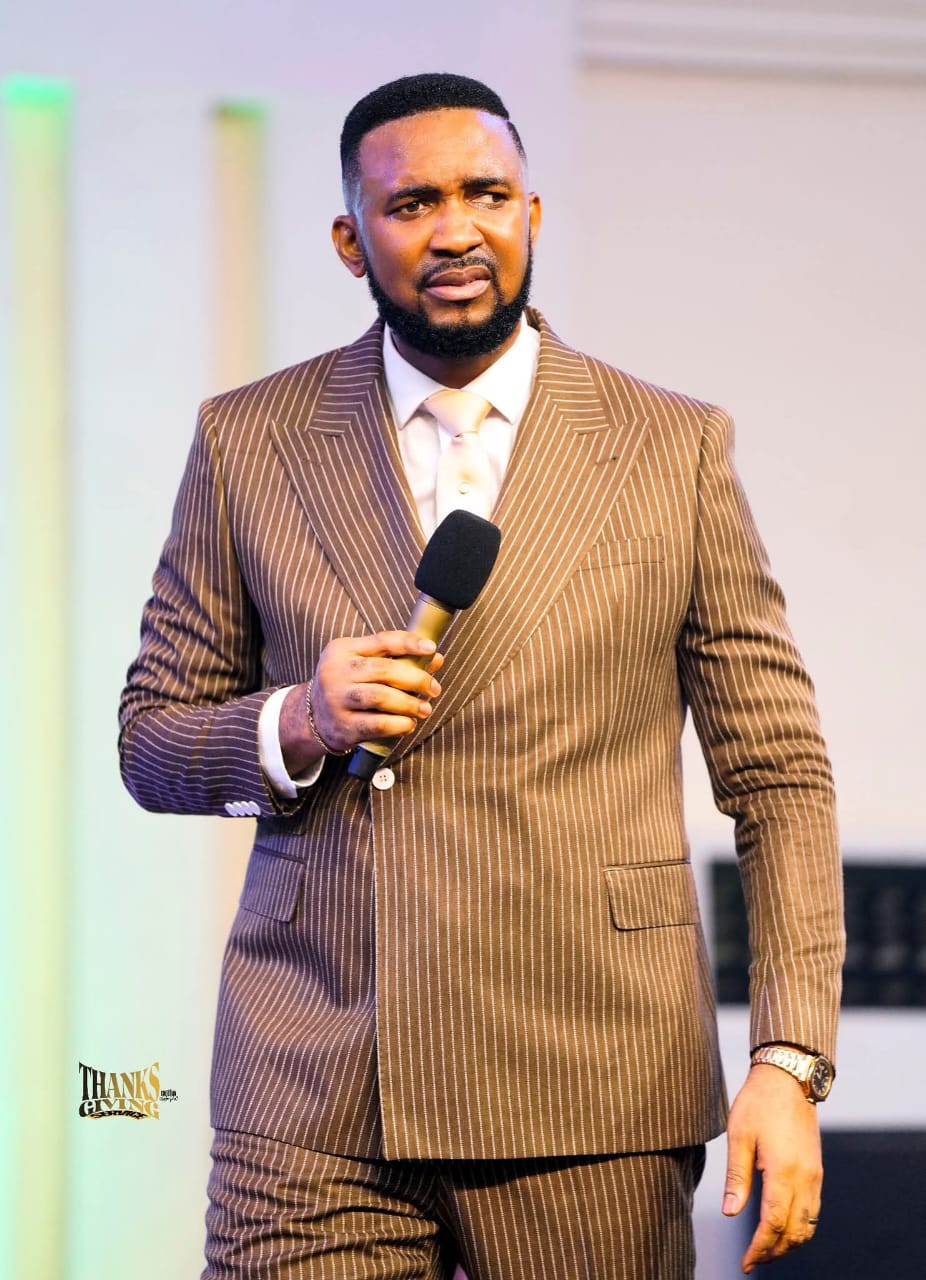
Wisdom of a Mature Believer: Don’t Judge What You Don’t Know — Dr. Chris Okafor
“To provoke mercy, keep sowing mercy.”
Mercy is often defined as compassion shown to someone who deserves punishment. It is the conscious decision to forgive when one has the power to condemn.
This formed the core of the message delivered by the Generational Prophet of God, Christopher Okafor, during the Grace Nation Glorious Sunday Service held at the international headquarters of Grace Nation Worldwide in Ojodu Berger, Lagos, Nigeria.
The Act and Power of Mercy
Preaching on the topic “The Act and Power of Mercy,”
Dr. Okafor emphasized that mercy is the believer’s escape from judgment. Referencing Psalm 136:1–20, he explained that mercy does not appear randomly; it is activated by deliberate spiritual actions and attitudes.
According to him, many people forfeit divine privileges because they are quick to judge.
A mature believer, he warned, must resist rushing to conclusions. In some cases, what appears to be clear evidence may not reflect the full truth.
“Don’t judge what you do not fully understand,” he cautioned, stressing that premature judgment can shut the door to mercy.
What Provokes Mercy?
Dr. Okafor outlined key spiritual principles that activate divine mercy:
Prayer
Prayer in deep and sincere dimensions attracts mercy. At the throne of grace, God considers the petitions of those who remain committed to Him. Even when a believer falls short, consistent prayer and kingdom partnership can move God to show mercy.
Total Repentance
Acknowledging wrongdoing and genuinely turning away from it provokes mercy. When a person presents their case before God with sincere repentance, divine compassion is released.
Sowing Mercy
Mercy operates like a seed. What a person sows is what they reap. Showing compassion, forgiveness, and kindness to others creates a harvest of mercy in return.
Unjust Hatred
Dr. Okafor also noted that when individuals are hated without cause, God may respond with mercy and divine elevation. What others fail to see in a person, God recognizes.
Conclusion
In closing, the Generational Prophet reiterated that mercy is both a principle and a harvest.
“To provoke mercy,” he declared, “keep sowing mercy.”
The service was marked by strong prophetic manifestations, including testimonies of deliverance, miracles, healings, restoration, and solutions to diverse challenges presented before God.
The Glorious Sunday Service concluded with a special thanksgiving celebration by members born in the month of February.
Sunday Adeyemi writes from Lagos
-

 celebrity radar - gossips6 months ago
celebrity radar - gossips6 months agoWhy Babangida’s Hilltop Home Became Nigeria’s Political “Mecca”
-

 society6 months ago
society6 months agoPower is a Loan, Not a Possession: The Sacred Duty of Planting People
-

 society5 months ago
society5 months agoReligion: Africa’s Oldest Weapon of Enslavement and the Forgotten Truth
-

 news6 months ago
news6 months agoTHE APPOINTMENT OF WASIU AYINDE BY THE FEDERAL GOVERNMENT AS AN AMBASSADOR SOUNDS EMBARRASSING

